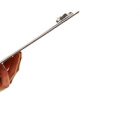I’ve just returned from Florida, having spent almost two weeks with my sisters, taking care of details since Dad died.
There were plenty of tears – of course. But even more, there was laughter! Because despite our mourning, we shared many marvelous family memories as we uncovered this treasure (good grief – our grade school report cards!) or that one (did we really wear our hair like that in the 80s?)
And of course, there were the conversations. Quite surprising, more than 100 people attended Dad’s memorial service. It was a memorial service like few others – exactly what Dad requested – a celebration – a party! …including an open bar and hors d’oeuvres afterwards. The readings and passages were appropriately mournful. But more than that, they were an homage to a man loved and respected by many. My sisters and I were so very proud of the man who was our father.
Included in the celebration service was music, of course. But not what you might expect. Instead we played a Glenn Miller CD, and a mix of other music from the 1940s. In the Mood, Candy, Boogie Woogie Bugle Boy — Dad would have loved it! I know his friends did.
The music – it was an important part of Dad’s life – and his death. In fact, through his final few days, I asked his hospice nurse to turn on the TV cable channel that played 1940s music – because it brought him so much pleasure to listen to the songs he shared with Mom as they were dating, fell in love and married. It seemed to work well, taking his mind off his pain, as he finally relaxed, slept, and then passed.
Music as therapy – there is absolutely nothing new about that concept. It’s a college major, it’s offered to hospital patients, and sometimes its presence isn’t intentional as therapy, but it helps just the same. In fact, the “right” music can be so powerful that stores play certain eras of music during certain times of the day to motivate shoppers to spend more money.
Music can be a great form of advocacy, too.
For example, if you are called upon to help someone who will undergo chemo, why not ask them what kinds of music they like, then set up an iPod or some other small player device with their choices so they can listen during treatment? Playing soft music while a client recovers from surgery can provide a soothing atmosphere. If you are working with a caregiver who is overseeing care for an elderly parent, you can supply music to both. Caregiving is stressful. Providing much-loved music to all parties to provide a soothing backdrop can reduce some of that stress.
The key, of course, is to focus on their choices – not yours. Dad loved the music of the 1940s. My choices would be much different – maybe the 1960s, or even some Enya or Yanni. My husband would choose country music. What would you choose? And what would your clients choose?
No doubt you can think of other applications for music for your clients – a gift to them that can make a huge difference in both their experience with their health and medical care, and in their satisfaction in working with you, too.
Music is an inexpensive, yet potentially powerful touch that can make an enormous difference in your client’s life. It certainly gave Dad pleasure and provided some peace in his final days, too.
LEARN ABOUT APHA MEMBERSHIP | REASONS PATIENTS NEED ADVOCATES | MASTER LIST OF PRACTICE RESOURCES




